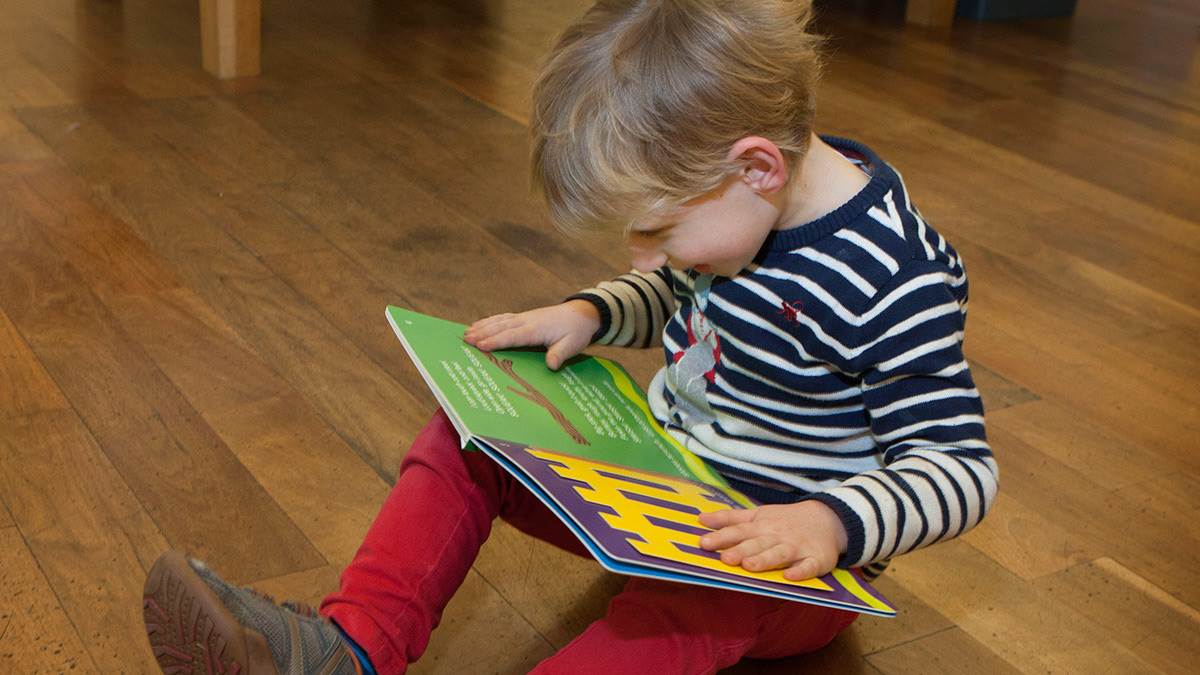Gifting Bookstart additional needs packs
Tips and guidance on gifting additional needs packs and how these tailored resources can support your work with children and families.
Bookstart additional needs packs are gifted in addition to BookTrust's other early years offers. The packs are gifted by a range of professionals and agencies, including Portage, Home-Start, nurseries, children’s hospitals and libraries.
The current packs are:
- Bookstart Shine for children who are deaf
- Bookstart Touch for children with a visual impairment
- Bookstart Star for children with conditions affecting their fine motor skills

The benefits of Bookstart additional needs packs
In 2016, BookTrust commissioned the University of Derby to evaluate Bookstart additional needs resources. The evaluation by Robinson et al found that:
The benefits of reading for pleasure are significant and often profound, reading books together offers children opportunities for comfort, closeness and well-being. Books are important to the lives of children with additional needs, providing focus on shared attention, pleasure and enjoyment, as well as scaffolds for development (e.g. stimulus for movement and communication).
Bookstart resources were highly valued by families and practitioners and contributed to delivering the positive outcomes identified above. Inclusive and diverse practices were found to be ‘already’ embedded in the resources, guidance and approach adopted by BookTrust.
Benefits of gifting the packs for children and their families
- Encourages mums, dads and carers to read to their child and helps challenge the perception that their child is too young to be read to
- Encourages parents and carers to look at what their child might best respond to
- Introduces families to different types of books in different formats
- For children who may not have access to books in their home, the pack is a valuable gift for the child and family
- The gift is something for families to keep and enjoy together
- The packs help families feel that their child is valued and that their needs are being considered
Gifting additional needs packs
The ages for gifting the additional needs packs mentioned above are a guideline and may vary depending on each individual child’s need. We would urge professionals to consider the needs of each child and gift an additional needs pack when you feel it is appropriate.
Bookstart additional needs packs are gifted by a number of different professionals. We know that every setting is slightly different depending on location, organisation type and local authority. If you need any support or guidance with gifting your Bookstart additional needs packs which isn’t covered below, please do get in contact with your local Bookstart Coordinator.
General tips for gifting all additional needs packs
- Discuss the content of the pack with the family
- Gift with the family as part of a session. Within the session, read the story so you can get a feel for the child’s interest and concentration level, and gauge if the language and pace are correct. This also models for the parents and carers how to adapt and read the book. The tactile books can be used during extended activities
- Not all packs are suitable for all children. Get to know the contents of each pack and how these could work to support the particular child you are working with
- Use your knowledge of the child’s interest, abilities and developmental level to decide which pack would most suit the child
- Don’t be afraid to change the words in the book when modelling to the parents
Considerations to make when gifting
Barriers Children may destroy books or explore them roughly. Consider the books you have with you, and the age of the child developmentally, and whether they would benefit more from the younger pack.
Parental perceptions Mums, dads and carers may consider their child is too young to be read to, or that their child may be too rough with books or chew on them and so don’t give them any. They may also think their child won’t benefit because of their additional need. It’s important to remind parents that no matter the need or age, or the way a child treats a book, books are beneficial. Hearing an adult’s voice reading a story or rhyme is always valuable for a child’s development and enjoyment.
The needs of the child
- There may not be an understanding of the ‘negative’, for example ‘that’s not my dinosaur’ may not be comprehended by the child you are working with - consider changing the words
- Base your gifting on the needs of the individual child. You do not have to gift to a specific age range, but can base your gifting on the child’s developmental stage. This ensures that the child and their family receive the appropriate resources

Key points to remember when gifting
- Keep the gifting fun
- Share the book
- Share key messaging with mums, dads and carers
- Ensure mums, dads and carers understand why book sharing is important, no matter the age or ability of the child
- Signpost other services which could support your families
Key messaging for mums, dads and carers
- You can be your child’s first and most important teacher. Stories, books and rhymes are an essential part of your child’s development, so it’s important to include them in your everyday routine. This will help your child develop many important skills that will help them become happy and confident learners
- It’s good to enjoy stories, book and rhymes with your child from as early an age as possible. Babies don’t need to understand all the words; they will just love to listen to your voice
- Sharing books and talking about the pictures will help you to build a strong loving relationship with your child. Everyone in the family can join in mums, dads, grandparents, brothers, sisters, aunties and uncles
- Your child will love lots of different kinds of books and will enjoy choosing ones for themselves. So why not have a look at joining the library
How to engage chidren and families with book sharing, stories and rhymes - by Tracy Harvey, Kent Portage Service, and Sharon Ensor, Portsmouth Portage Team
- Keep stories short and relevant, with simple rhyming in the text. Stories such as Goodnight Digger or Walking Through the Jungle, which are simple, repetitive stories
- Use props if they don’t distract the child too much
- Have a story at a set time in the visit, for instance at the end, and then gift the children the book at the end of your session, to be left with them
- Be animated and interesting, exaggerating and emphasising certain words
- For some children you will need to go slowly to give them time to process, while for others you will need to be quick to keep their interest, especially if they have a short attention span. You may need to reduce the language used, for instance by not reading all the words, by just using single words or by just talking about the pictures
- Teach mums, dads, carers and other adults how to adapt books to their child’s needs
- Try singing the words and repeating the story several times
- Know when the child has had enough, and move on
Download rhyme sheets
-
Rhymetime sheet with Polly Dunbar illustrations
A Rhymetime rhyme sheet with illustrations by Polly Dunbar.
-
Axel Scheffler Rhymetime rhymes sheet
A Rhymetime rhymes sheet with illustrations by Axel Scheffler.
Storybooks and games
Have some fun
Read along together with our brilliant interactive storybooks and play counting, colouring and drawing games.



